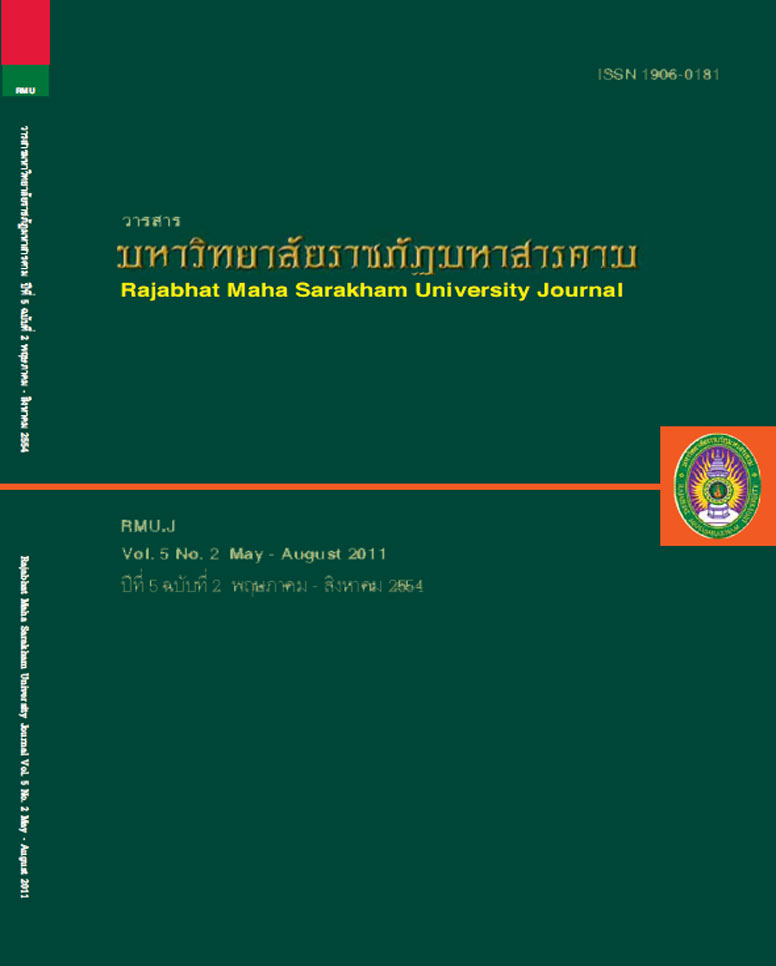การพัฒนาตัวบ่งชี้พฤติกรรมภาวะผู้นำทางวิชาการ ของผู้บริหารสถานศึกษาเทศบาล; Development of Indicators for Instructional Leadership Behaviors of Municipal School Principals
Main Article Content
บทคัดย่อ
การวิจัยนี้มีวัตถุประสงค์ประการแรกเพื่อสร้างและพัฒนาตัวบ่งชี้พฤติกรรมภาวะผู้นำทางวิชาการของผู้บริหารสถานศึกษา
เทศบาล และประการที่สองเพื่อทดสอบความสอดคล้องของโมเดลความสัมพันธ์โครงสร้างตัวบ่งชี้พฤติกรรมภาวะผู้นำ
ทางวิชาการของผู้บริหารสถานศึกษาเทศบาลที่สร้างและพัฒนาขึ้นกับข้อมูลเชิงประจักษ์ กลุ่มตัวอย่าง ได้แก่ ผู้บริหารสถานศึกษา
รองผู้บริหารสถานศึกษาฝ่ายวิชาการและครูหัวหน้ากลุ่มสาระการเรียนรู้ของสถานศึกษาที่จัดการศึกษาขั้นพื้นฐาน สังกัดเทศบาล
ในภาคตะวันออกเฉียงเหนือ จำนวน 920 คน ตัวแปรที่ใช้ในการวิจัย ประกอบด้วยตัวแปรแฝง และตัวแปรสังเกตได้ การเก็บ
รวบรวมข้อมูลตามสภาพจริงโดยใช้แบบสอบถามประเภทมาตราส่วนประมาณค่า (Rating scale) มีความเชื่อมั่นรายข้อ ระหว่าง
.9855 ถึง .9858 สถิติที่ใช้ คือ ค่าเฉลี่ย (Mean) ส่วนเบี่ยงเบนมาตรฐาน (Standard deviation) ค่าไค-สแควร์ (Chi-square)
ค่าดัชนีวัดระดับความกลมกลืน (GFI) และค่าดัชนีวัดระดับความกลมกลืนที่ปรับแก้แล้ว (AGFI) การวิเคราะห์ข้อมูลคำนวณ
ด้วยโปรแกรมคอมพิวเตอร์สำเร็จรูป ขั้นตอนการวิจัยแบ่งออกเป็น 3 ระยะ คือ ระยะที่ 1 การสร้างกรอบแนวคิดและร่างตัวบ่งชี้
พฤติกรรมภาวะผู้นำทางวิชาการ ระยะที่ 2 การพัฒนาตัวบ่งชี้พฤติกรรมภาวะผู้นำทางวิชาการ และ ระยะที่ 3 การทดสอบความ
สอดคล้องของโมเดลความสัมพันธ์โครงสร้างตัวบ่งชี้พฤติกรรมภาวะผู้นำทางวิชาการของผู้บริหารสถานศึกษาเทศบาล กับ
ข้อมูลเชิงประจักษ์ ผลการวิจัยพบว่า
1. ผลการสร้างและพัฒนาตัวบ่งชี้พฤติกรรมภาวะผู้นำทางวิชาการของผู้บริหารสถานศึกษาเทศบาล พบว่า มีองค์ประกอบ
หลัก 5 องค์ประกอบ และตัวบ่งชี้ 75 ตัว ดังนี้ คือ 1) องค์ประกอบหลักด้านการกำหนดทิศทางและนโยบาย ตัวบ่งชี้ 17 ตัว
2) องค์ประกอบหลักด้านการสร้างสภาพแวดล้อมที่เอื้อต่อการเรียนรู้ ตัวบ่งชี้ 15 ตัว 3) องค์ประกอบหลักด้านการพัฒนาวิชาชีพ
ครูและบุคลากร ตัวบ่งชี้ 10 ตัว 4) องค์ประกอบหลักด้านการบริหารหลักสูตรและการจัดการเรียนรู้ ตัวบ่งชี้ 20 ตัว และ
5) องค์ประกอบหลักด้านการส่งเสริมคุณภาพนักเรียน ตัวบ่งชี้ 13 ตัว
2. ผลการทดสอบความสอดคล้องของโมเดลความสัมพันธ์โครงสร้างตัวบ่งชี้พฤติกรรมภาวะผู้นำทางวิชาการของผู้บริหาร
สถานศึกษาเทศบาล พบว่า โมเดลมีความสอดคล้องกับข้อมูลเชิงประจักษ์ โดยมีค่าไค-สแควร์ (Chi-square) เท่ากับ 78.79
ค่า P เท่ากับ .27283 ค่าดัชนีวัดระดับความกลมกลืน (GFI) เท่ากับ .99 ค่าดัชนีวัดระดับความกลมกลืนที่ปรับแก้แล้ว (AGFI)
เท่ากับ .98 ค่าประมาณความคลาดเคลื่อนของรากกำลังที่สองเฉลี่ย (RMSEA) เท่ากับ .010 และค่าขนาดตัวอย่างวิกฤติ (CN)
เท่ากับ 1135.01;
This research aimed to construct and develop indicators for instructional leadership behaviors
of municipal school principals, and to test congruence of the developed model of relationship, structure,
and indicators for instructional leadership behaviors of municipal school principals with the empirical data.
The sample consisted of 920 subjects: municipal school principals, assistant school principals for academic
affairs and head teachers of learning strands at municipal schools in the Northeast of Thailand that
provide basic education. The variables used in the research were latent variables and observed
variables. Data were authentically collected by using a rating scale questionnaire with .9855-.9858
reliability. The statistics were mean, standard deviation, chi-square, GFI and AGFI. Data were analyzed
by using a computer program. The research was conducted in 3 phases: Phase 1 was constructing
conceptual framework and drafting indicators for academic leadership behaviors; Phase 2 was
developing indicators for instructional leadership behaviors; and Phase 3 was testing congruence of
the model of relationships, structure, and indicators for instructional leadership behaviors of municipal
school principals with the empirical data.
The research results were as follows:
1. Results of the study revealed the following 5 major factors and 75 indicators of academic
leadership behaviors: 1) determining the direction and policy with 17 indicators; 2) creating the
environment conducive to learning with 15 indicators; 3) developing the teaching profession and
personnel with 10 indicators; 4) curriculum implementation and knowledge management with 20
indicators; and 5) student quality enhancement with 13 indicators.
2. Testing the congruence of the model of the relationship, structure, and indicators for academic
leadership behaviors of municipal school principals revealed that the model was in congruence with
the empirical data: Chi-square = 78.79, P = .27283, GFI = .99, AGFI = .98, RMSEA = .010, and CN =
1135.01.
Article Details
1. บทความที่ลงตีพิมพ์ทุกเรื่องได้รับการตรวจทางวิชาการโดยผู้ประเมินอิสระ ผู้ทรงคุณวุฒิ (Peer Review) สาขาที่เกี่ยวข้อง อย่างน้อย 3 ท่าน ในรูปแบบ Double blind review
2. ข้อคิดเห็นใด ๆ ของบทความที่ลงตีพิมพ์ในวารสารมหาวิทยาลัยราชภัฏมหาสารคาม นี้เป็นของผู้เขียน คณะผู้จัดทำวารสารไม่จำเป็นต้องเห็นด้วย
3. กองบรรณาธิการวารสารมหาวิทยาลัยราชภัฏมหาสารคาม ไม่สงวนสิทธิ์การคัดลอกแต่ให้อ้างอิงแสดงที่มา


